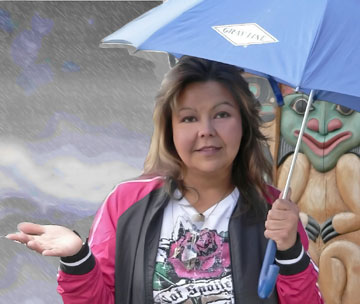 By Carrie James March 23, 2006
The people of Hydaburg, Ketchikan Indian Community, and Central Council of Tlingit & Haida and all Tribes of Alaska have inherent rights, as well as other indigenous peoples of Alaska and the United States.
Because the spraying could be a direct threat to our subsistence way of life, one of the most basic human rights of a people could be violated. That is, the collective (or group) right of a people not to be deprived of its own means of subsistence. Article l, paragraph 2 of the International Convenant on Civil and Political Rights (ICCPR) states, among other things "In no case may a people be deprived of it's own means of subsistence." This Covenant (or treaty) entered into force on March 23, 1976 almost thirty years ago to the day. The United States Government ratified the ICCPR under the administration of H.W. Bush, September 8, 1992 with no reservations under Article 1. All governments in the international system (including the U.S. government) have legally binding obligations on several levels regarding international human rights law that they voluntarily ratified. The first is to promote these rights, so that everyone is aware of them. The officials at the Department of Environmental Conservation (DEC) may or may not even be aware that what are doing could be in violation of existing, legally-binding international human rights law. Unfortunately, this is frequently the case. The second is to protect these rights, to see that your human rights are not threatened, undermined, or abused by other governments (such as State or local) or other entities (such as corporations). And the third is to facilitate or fulfill these rights, which basically means to work with us (Tribes), in support of our efforts to excercise our human rights. Additionally, treaties are considered to be the 'supreme Law of the Land,' according to Article 6 of the United States Constitution. (Any covenant, including this Covenant, is a treaty) But, it would seem to me that Klukwan, Inc., would have to enter into discussion to establish through research that is acceptable to Hydaburg or Ketchikan, that we are not deprived of our 'own means of subsistence', as provided for under international law. This is not just a bad or appalling situation; this is a potential violation of our human rights. We don't have to fight for this right, we already have it. Human rights don't work like other laws, they are defined in the international community as, among other things, inherent (or pre-existing) They belong to Hydaburg, and other Tribes as long as we exist, because we exist); inalienable (they cannot be bought, sold, or taken away by anyone or any other group), and indivisible ( which basically means that the undermining of one human right can affect all the others). Human Rights:
Indigenous peoples are recognized
and affirmed and respected and protected (not the same being
'given'). Different governments in the world recognize
and affirm different rights in different degrees. There have been some very interesting and tragic studies done on the effects of "agent orange" (no doubt similar in chemical composition) on the tribal people of Vietnam. There was a program on BBC on the genetic effects that are now just coming to the surface. We could face similar problems with the herbicides that are being introduced to be aerially sprayed on Long Island. It could take years for negative effects to surface. There is a link if any concerned citizens want to see what agent orange has done to the indigenous people of Vietnam as well as our Armed Service men. (Click here) The reason over 900 people sent in comments, most of them opposing the permit, is that they are worried. Yes, even those 700 or so people that sent in "form" comments that DEC says are not important. They still were worried enough to send comments. DEC needs to take another look at our rights as indigenous peoples, our human rights. I welcome all comments to my viewpoint! Concerned Citizen and Subsistence user, Carrie L. James
About: Carrie James is current ANS Ketchikan Camp #14 President, current ANS Grand 2nd Vice President, past Tlingit & Haida delegate, and past Tribal Council member for Ketchikan Indian Community (KIC)
and do not necessarily reflect the opinions of Sitnews.
|
||
